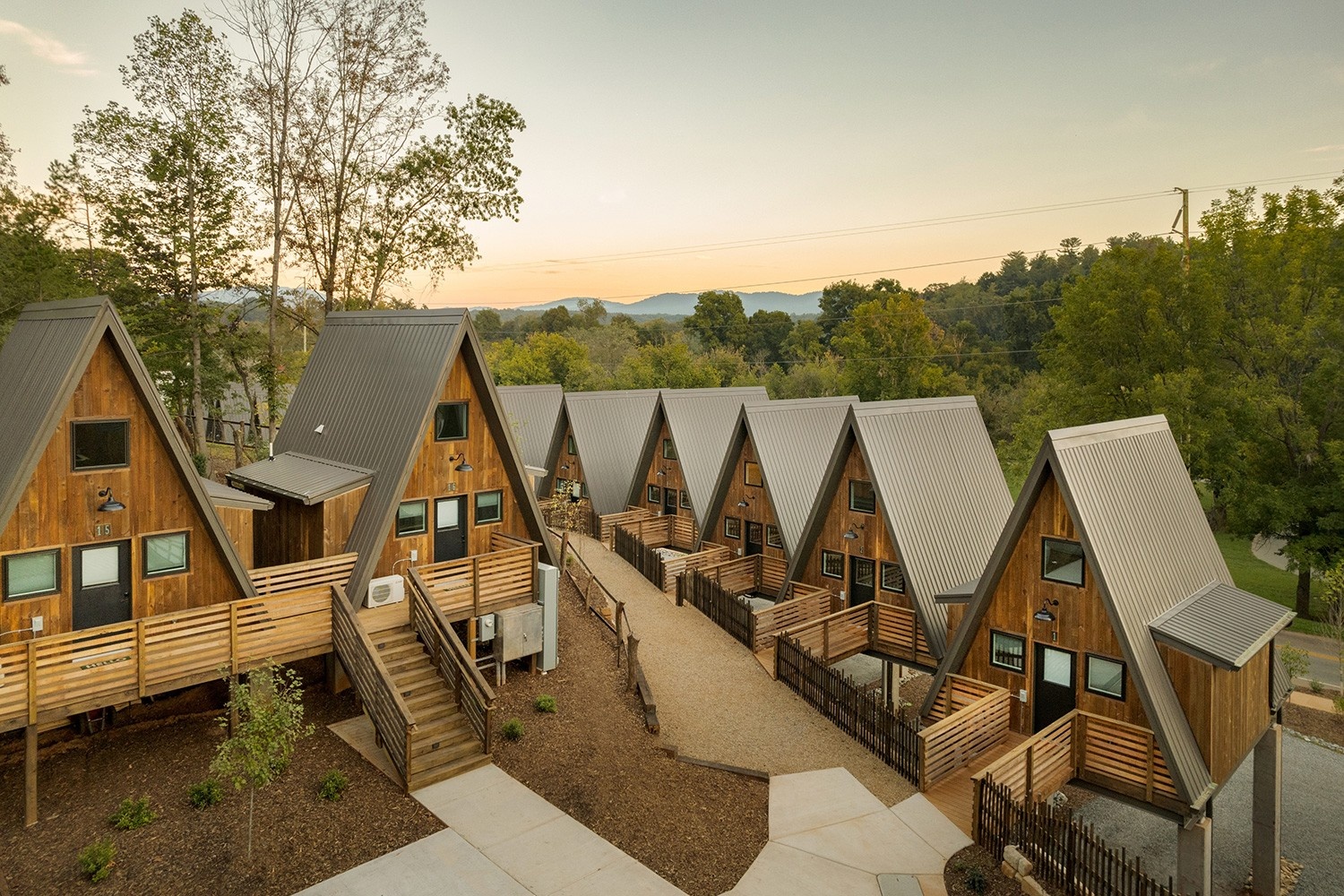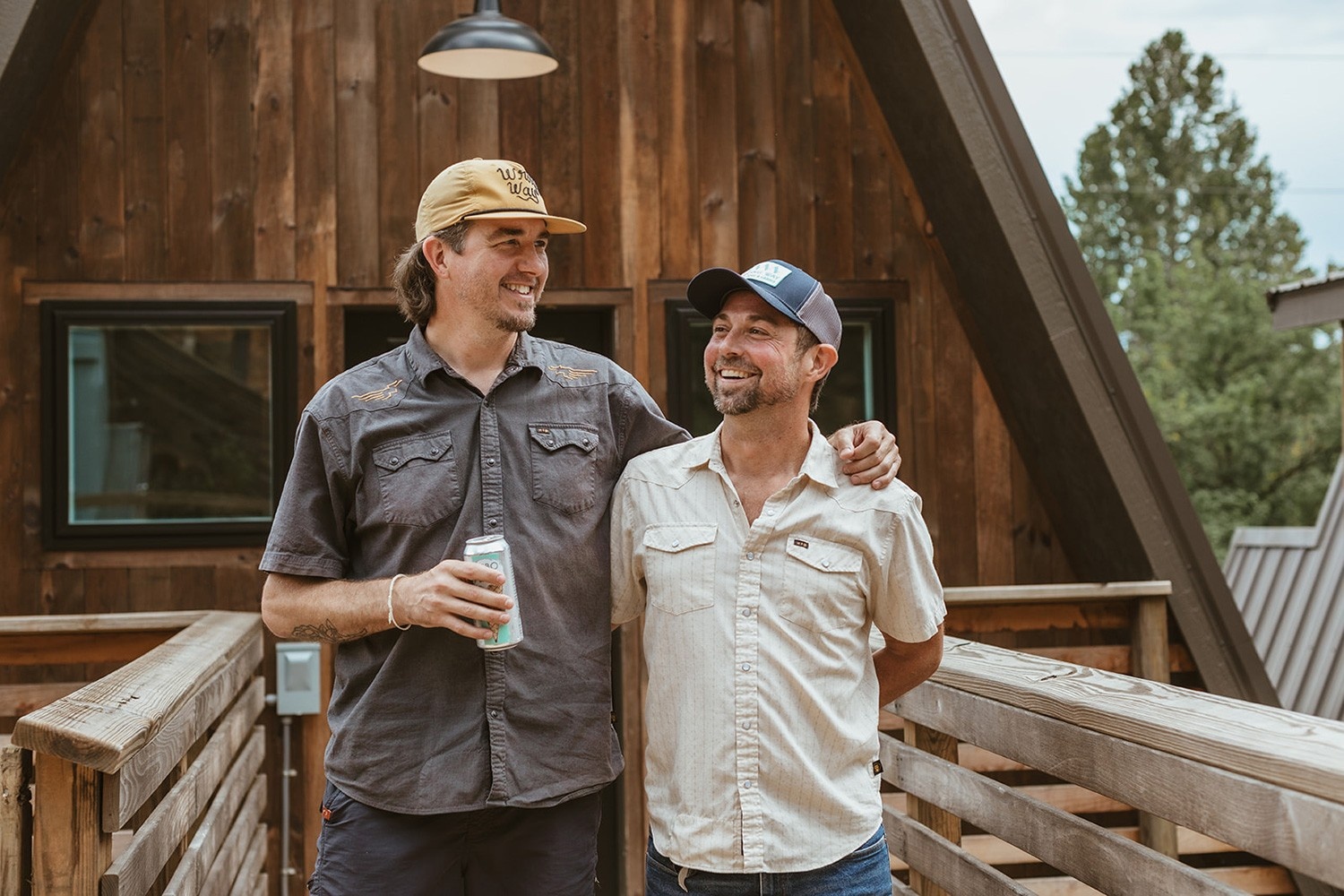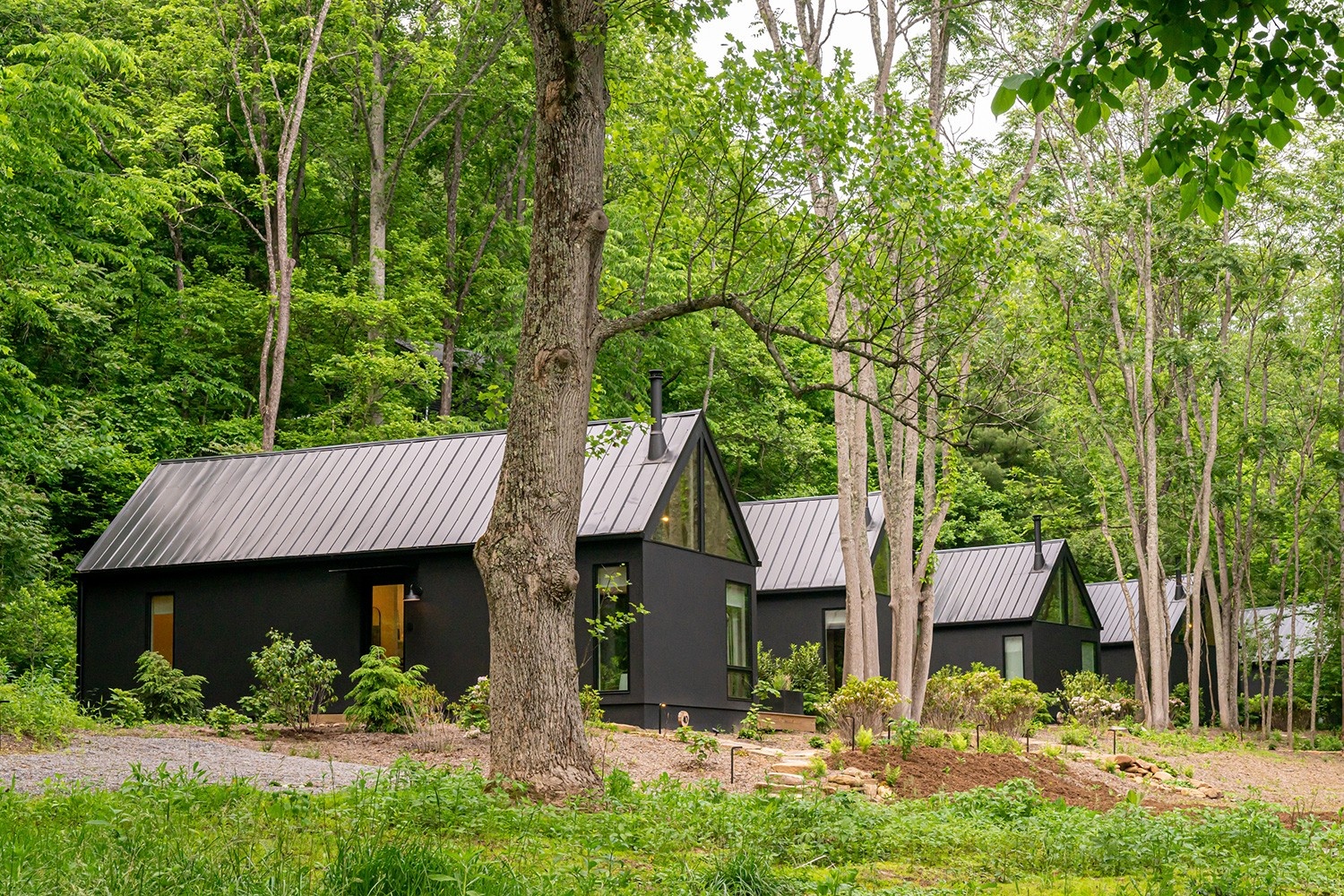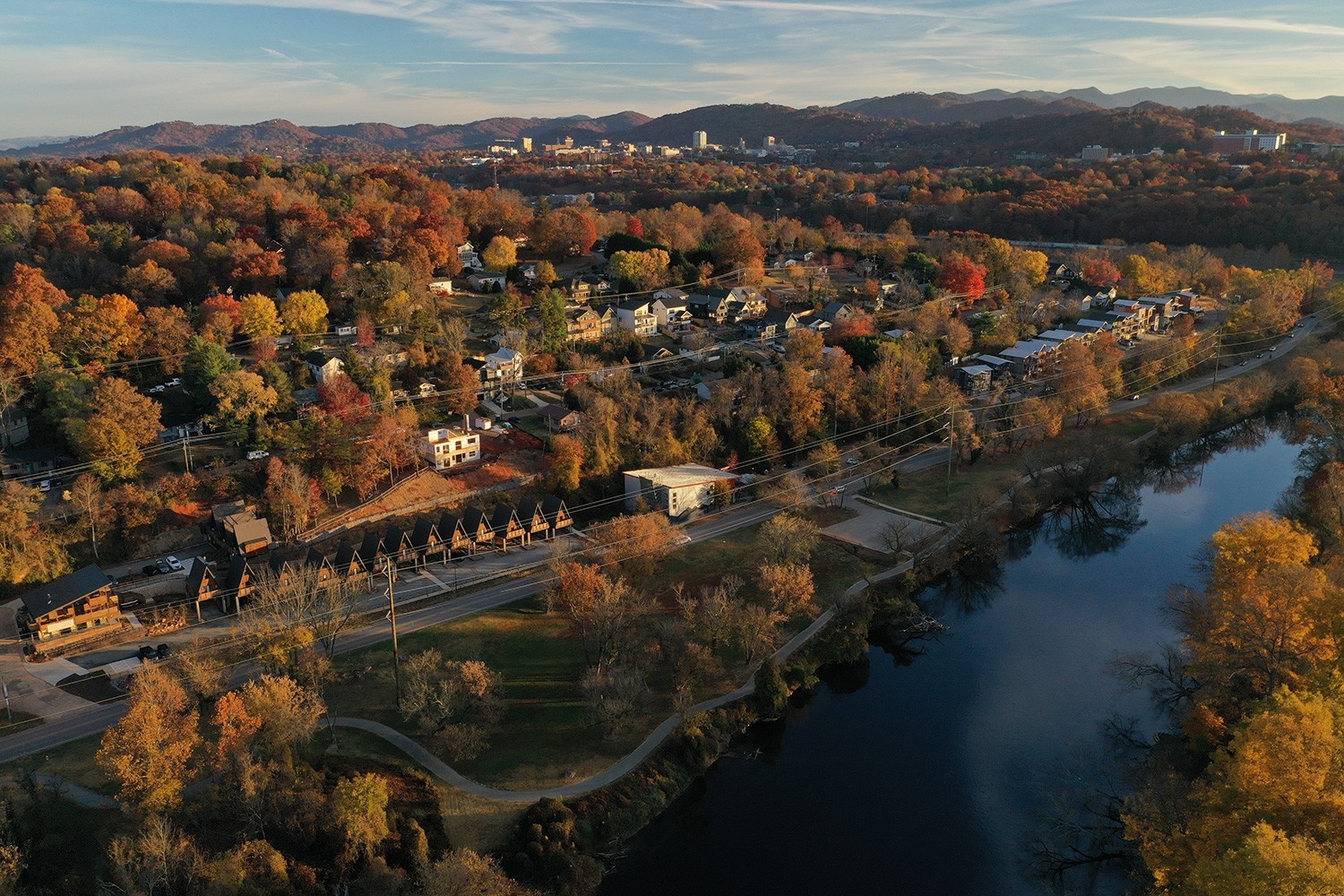North Stars:

Community Support

Climate Action

Wildlife Ecosystems
“It’s so important that this area sees tourism again. It’s just what everybody’s livelihood and the economy there is based on.”

Built on elevated foundations, Wrong Way_s cabins were able to avoid the worst of Helene_s floodwaters. Courtesy of Colby Rabon
Western North Carolina has one of the nation’s oldest mountain ranges, the Appalachian Mountains, with a reputation for world-class hiking, charming towns, and the Blue Ridge Parkway, a scenic byway winding through the region.
But in September 2024, Hurricane Helene made its way up from Florida, bringing destruction through this corner of the state. High winds brought down trees and homes, falling onto roadways and making communities inaccessible. The French Broad River rose to record levels, sweeping bridges away. All in, the storm accounted for almost $60 billion worth of damage across several counties, both urban and rural.
As the region emerged from the tragedy to face the challenge of rebuilding, one question hung over everyone’s heads. Tourism makes up roughly 20 percent of the economy in Buncombe County, where Asheville is located, contributing nearly $3 billion locally. What would happen without that badly needed income? Was it possible to handle the return of tourism while communities were still recovering? How does one build back better in a region once touted as a climate haven safe from the worst effects of climate change?
Come Hell or High Water
Ali Rasmussen and her husband Eric opened their first Spacious Skies campground in 2021 in Maine after falling in love with the outdoors during the pandemic.
“We always intended for Spacious Skies to be something bigger than one location and something bigger than, you know, us running a campground,” she says. “We just had greater ambitions.”
The campground company continued to expand, including the Bear Den location in Spruce Pine, North Carolina, about an hour and a half northeast of Asheville, with hiking trails to scenic waterfalls, a playground, and both campsites and cabins. It was also in the path of Helene.
“We were tracking the storm because it was obviously going to be a big one,” she adds. “Everybody was preparing as much as possible. But truly, what happened was so much more extreme for Bear Den.”
A week after the storm, Rasmussen and her team started to plan for how they’d help Bear Den, which is right on the Blue Ridge Parkway and had been subject to downed trees and washed-out roads. The campground also had no power or water. Thankfully, there had been no injuries to the people who stayed behind.
“[We] devised a plan to be able to feel secure with fuel and be able to collect supplies along the way because what we were hearing was that they were stuck up on the property, on the mountain.”
They were able to make the trek from Hayden Creek, another Spacious Skies campground in Marion, to Bear Den.
“[It] usually takes about a 45-minute drive, but it was like two or three hours. It took us to finally figure out a way out because we kept hitting roadblocks and washouts. The road up was the scariest drive of my life,” she recalls.
But the crew was able to band together to help bring the site back to its former state. The only losses were a few cabins and personal property, and Bear Den was able to reopen in October, roughly a month after Helene hit.
“We’re back, and that’s just not the story that everybody has. We’re fortunate and grateful,” says Rasmussen.

Wrong Way owners Joe Balcken and Shelton Steele. Courtesy of Wrong Way River Lodge & Cabins
Helping Hands
While some lost everything in Helene’s floodwaters, others were luckier and escaped with less or manageable damage. For businesses and individuals fortunate enough to emerge relatively unscathed, they’ve found ways to help their communities, whether it’s helping with cleanup efforts or providing a place where people can come together and enjoy moments of peace.
Sitting along the French Broad River in Asheville’s famed River Arts District, Wrong Way River Lodge & Cabins opened in 2022 with 16 A-frame cabins along the riverfront. Owners Joe Balcken and Shelton Steele created it as a community basecamp where travelers can mingle with rafting guides, who set up just across the street.
During the storm, the river reached a record-breaking 24 feet, coming right to the lodge’s front steps and damaging several cabins. Because of the cabins’ elevated construction, damage was thankfully minimal.
“We were built to flood. All the structures sit way up off the ground. I think that had a lot to do with our ability to kind of clean up quickly and put everything back together,” says Steele. “There was just the unworldly shock that they could flood at the heights that they’re at. Because the lowest cabin sits ten feet off the ground, and on that end of the property, we had 15 feet of water.”
“My business partner, Joe, and I both worked on rivers as guides in different forms. You kind of have to give nature reverence, right? Nature’s going to always prevail, and it’s always bigger and stronger than we give it credit for,” he adds.
Because Wrong Way was able to come back online at a faster pace, it was able to serve the community differently, working with Asheville RiverLink as a base for cleanup initiatives and hosting another with Mountain True in the still-battered district.
The site also works closely with the community to boost morale and offer support, hosting a monthly music series, food vendors, and even a tattoo pop-up in one of the cabins. There’s also an upcoming fly fishing festival to benefit Borne from Blue Lines, supporting guides and outfitters affected by Hurricane Helene.
“We’ve always tried to mix our local population in with our guests. It’s also really focused on our neighborhood, our friends, and family to get them out to the property to be engaged.”

The cabins at Firelight. Courtesy of Firelight at Shope Creek
Firelight at Shope Creek, a boutique cabin retreat in East Asheville, also had to close for months after the storm, after only being open for less than a year. Owners Shari Robins and Amy Cavanaugh bought the property over a decade earlier with dreams of opening the Scandinavian-inspired resort.
“We definitely had flooding. But thankfully, the majority of our structures were just out of reach of the water,” says Cavanaugh. “Our culvert, our only access into the property, was completely washed out. So there was no way to drive in or out.”
“We had just completed some awesome hiking trails. So all of those have been kind of cut off,” adds Robins.
The Comeback Community
The storm fell during the region’s high season, when campgrounds and hotels would have been fully booked with travelers looking for fall color and outdoor exploration. It’s now been six months since Helene’s devastation.
“I still keep hearing from a lot of people that there’s still this assumption that Asheville is just a ruin,” says Cavanaugh.
But the community is ready to welcome visitors. Just ask the people who live and work there. In Asheville, 85% of the hospitality businesses are back open and so are over 100 miles of trails in Pisgah National Forest.
“It’s so important that this area sees tourism again. It’s just what everybody’s livelihood and the economy there are based on,” says Rasmussen.
As climate disasters become an unfortunate near-certainty, the resilience of Western North Carolina may be a reminder to other places of what is possible when we come together.

Caroline Eubanks is an Atlanta, Georgia-based Lowell Thomas award-winning writer and author of This Is My South: The Essential Travel Guide to the Southern States and A Boozy History of Atlanta: People, Places & Drinks that Made a City. Her work has appeared in Lonely Planet, the Chicago Tribune, Architectural Digest, the Washington Post, and VinePair. Follow her travels in the South and beyond (plus lots of dog photos) on Instagram at @cairinthecity and through her website.
North Stars: Climate Action, Community Support, Wildlife Ecosystems



